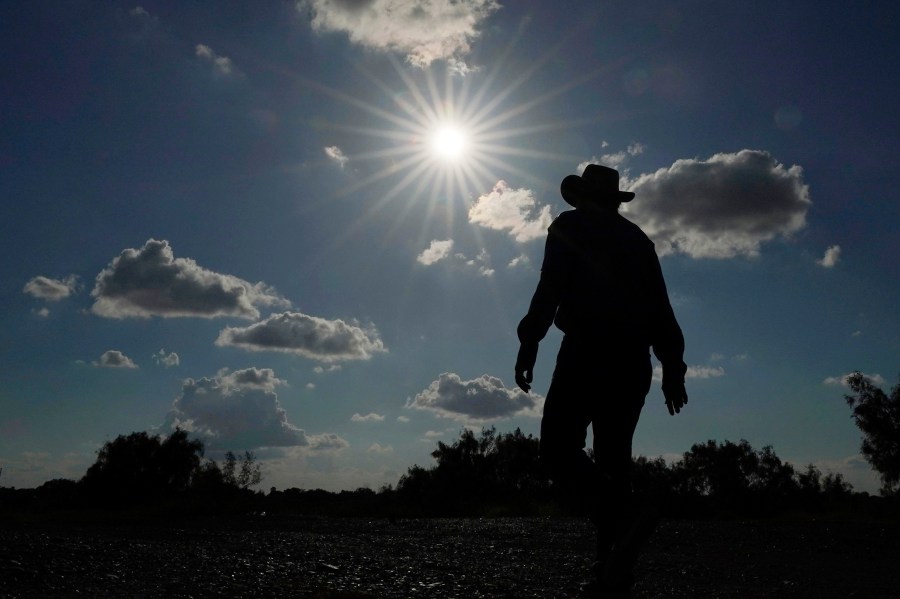Health
Texans Urged to Monitor Elderly Amid Dangerous Summer Heat

The intense summer heat in Texas has prompted local experts to emphasize the importance of monitoring elderly individuals as temperatures soar. According to the Texas Department of State Health Services, more than 300 people in Texas lost their lives to heat-related illnesses in 2023. As the state braces for another scorching summer, families are being encouraged to take proactive measures to safeguard vulnerable loved ones, particularly those aged 65 and older.
Central Texas frequently experiences extreme heat, with Austin averaging around 16 triple-digit days per year from 1898 to 2023. The summer of 2011 was particularly severe, witnessing a staggering 90 days where temperatures exceeded 100 degrees Fahrenheit. Reports from the city of Austin indicate that over 1,300 heat-related illnesses were documented throughout the summer of 2024, underscoring the ongoing dangers of extreme heat.
Dr. Balu Natarajan, chief medical officer and executive vice president at AccentCare, noted that elderly individuals are at a heightened risk for heat-related complications. “I am worried that our numbers could be record numbers in terms of illness and death this year,” he stated. He explained that as people age, their bodies become less efficient at regulating temperature, likening the human body to a thermostat that can become overwhelmed by extreme conditions.
While elderly individuals are particularly susceptible, Dr. Aaron Alar Khan, CEO of Family Eldercare, added that other vulnerable populations also face increased risks. These include individuals with disabilities, chronic medical conditions, low-income families, and those lacking access to air conditioning or other cooling methods.
Understanding why older adults are more vulnerable is key. Dr. Natarajan elaborated that the internal thermoregulation of older adults is less effective compared to younger individuals. Many also contend with chronic health conditions that further complicate their bodies’ ability to cope with extreme heat. Medications can also impact hydration and temperature regulation, making it essential for caregivers and family members to monitor their intake of water and electrolytes.
Certain underlying health issues exacerbate the risk of heat-related illnesses. Dr. Natarajan identified heart disease, lung disease, diabetes, and neurological disorders as particularly concerning. “If someone has dementia or has had a stroke, then their thermostat is more likely to be off,” he explained. Complications from these health conditions can hinder the body’s ability to manage temperature, especially during extreme weather.
To mitigate the effects of heat, Dr. Natarajan recommended several strategies. Staying hydrated is crucial, particularly for those with heart failure or diabetes, who may be naturally dehydrated. He advised against consuming alcohol, coffee, and sugary drinks before spending extended periods outdoors. Limiting outdoor activities, wearing light clothing, and utilizing fans or air conditioning are also effective ways to stay cool.
The need for vigilance during heat waves cannot be overstated. Dr. Natarajan emphasized the importance of routinely checking on elderly family members, friends, and neighbors. He pointed out that while extreme heat may not seem as urgent as a severe storm, it poses a similar risk to health and wellbeing. “If there were a terrible storm, we would have a tendency to be checking in with our loved ones,” he said, urging families to adopt the same approach during heat waves.
In response to the ongoing risk posed by high temperatures, KXAN and Family Eldercare have launched the 35th annual Family Eldercare Summer Fan Drive, aimed at providing box fans to those in need. With a goal of distributing 10,000 fans across Central Texas, the initiative seeks to alleviate the effects of extreme heat, particularly among the elderly. As of August 1, over 900 donations had already been collected at various locations.
The drive continues to accept donations through September 15. Dr. Khan highlighted the importance of such contributions, stating, “When we go into the homes of our clients who need a fan, unfortunately, that is not the only assistance they need.” Donations not only provide relief from heat but also support broader services aimed at helping clients achieve greater self-sufficiency.
For individuals in need of a box fan, distribution sites are available through the Family Eldercare website. As the Texas heat continues to pose a serious threat, community efforts and individual vigilance remain crucial in protecting the most vulnerable members of society.
-

 Technology4 months ago
Technology4 months agoDiscover the Top 10 Calorie Counting Apps of 2025
-

 Health2 months ago
Health2 months agoBella Hadid Shares Health Update After Treatment for Lyme Disease
-

 Health3 months ago
Health3 months agoErin Bates Shares Recovery Update Following Sepsis Complications
-

 Technology3 weeks ago
Technology3 weeks agoDiscover 2025’s Top GPUs for Exceptional 4K Gaming Performance
-

 Technology2 months ago
Technology2 months agoElectric Moto Influencer Surronster Arrested in Tijuana
-

 Technology4 months ago
Technology4 months agoDiscover How to Reverse Image Search Using ChatGPT Effortlessly
-

 Technology4 months ago
Technology4 months agoMeta Initiates $60B AI Data Center Expansion, Starting in Ohio
-

 Technology4 months ago
Technology4 months agoRecovering a Suspended TikTok Account: A Step-by-Step Guide
-

 Health4 months ago
Health4 months agoTested: Rab Firewall Mountain Jacket Survives Harsh Conditions
-

 Lifestyle4 months ago
Lifestyle4 months agoBelton Family Reunites After Daughter Survives Hill Country Floods
-

 Technology3 months ago
Technology3 months agoUncovering the Top Five Most Challenging Motorcycles to Ride
-

 Technology4 weeks ago
Technology4 weeks agoDiscover the Best Wireless Earbuds for Every Lifestyle





















